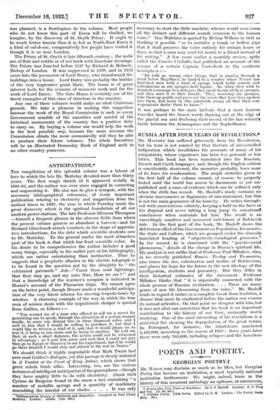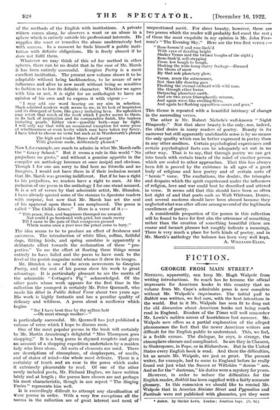POETS AND POETRY.
GEORGIAN POETRY.f MR..MAnsu may disclaim as much as he likes, but Georgian Poetry has become an institution, a most typically national institution furthermore. We might, indeed, trace in the history of this recurrent anthology an epitome, or microcosm, • Russia after Four Years of Revolution. By S. S. Masioff. London : P. 8. King
and Bon. l5s. 6d. net.]
Georgian Poetry. Filth Series. Edited by E. IL London : The Poetry Boa, shop. [66.] • of the methods of the English with institutions. A private citizen comes along, he observes a want or an abuse in a sphere which is entirely outside his professional interests. He supplies the want or remedies the abuse unobtrusively but with success. In a moment he finds himself a public insti- tution with definite obligations. He is freely abused if he does not fulfil them.
Whatever we may think of this ad hoc method in other spheres, there can be no doubt that in the case of Mr. Marsh it has been entirely successful. Georgian Poetry is a most excellent institution. The present new volume shows it to be adaptable without being baokboneless, to be aware of new influences and alive to new merit without being so sensitive
to fashion as to lose its definite character. Whether we agree with him or not, it is right for an anthologist to have an opinion of his own and to express it with vigour :—
" I may add one word bearing on my aim in selection. Much admired modern work seems to me, in its lack of inspiraton and its disregard of form, like gravy imitating lava. Its upholders may retort that much of the work which I prefer seems to them, in its lack of inspiration and its comparative finish, like tapioca imitating pearls. Either view—possibly both—may be right. I will only say that with an occasional exception for some piece of rebelliousness or even levity which may have taken my fancy,
i
I have tried to choose no verse but such as n Wordsworth's phrase The high and tender Muses shall accept
With gracious smile, deliberately pleased."
Now I, for example, see much to admire in what Mr. Marsh calls the "Gravy School." But it seems a rule in this world "No prejudices no gusto," and without a genuine appetite in the compiler an anthology becomes at once insipid and obvious. Though I for one am sorry to find here no Sitwells and no Imagists, I would not have them in if their inclusion meant that Mr. Marsh was growing indifferent. But if he has a right to his prejudices, we readers have a right to ours. At the inclusion of one poem in the anthology I for one stand amazed. It is a set of verses by that admirable artist, Mr. Blunden. I have already quoted some of the stanzas to Spectator readers with surprise, but now that Mr. Marsh has set the seal of his approval upon them I am nonplussed. The poem is called "The Child's Grave." Here is a verse of it This peace, then, and happiness thronged me around.
Nor could I go burdened with grief, but made merry Till I came to the gate of that overgrown ground
Where scarce once a year sees the priest come to bury." The idea seems to be to produce an effect of freshness and naiveness. The introduction of white lilies, coffins, faithful dogs, flitting birds,- and spring sunshine is apparently a deliberate effort towards the reclamation of these "pro- perties." To me the effort at floating these things seems entirely to have failed and the poem to have sunk to the level of the parish magazine serial whence it drew its images.
Mr. Blunden is one of the seven newcomers to Georgian Poetry, and the rest of his poems show his work to great advantage. It is particularly pleasant to see the merits of the admirable " Cottager's Pig" acknowledged. Of the other poets whose work appears for the first time in the collection the youngest is certainly Mr. Peter Quennell, who made his debut in Public School Verse about two years ago His work is highly fantastic and has a peculiar quality of delicacy and wildness. A poem about a sunflower which begins
"See I have bent thee by thy saffron hair —Oh most strange masker—" is particularly successful. Mr. Quermell has just published a volume of verse which I hope to discuss soon.
One of the most popular poems in the book will certainly be Mr. Martin Armstrong's delightful "Miss Thompson goes shopping." It is a long poem in rhymed couplets and gives an account of a shopping expedition undertaken by a maiden lady who lives alone. All sorts of elements are used. There are descriptions of atmosphere, of shopkeepers, of smells, and of states of mind—the whole most delicate. There is a certainty of touch and an case in the poem which make it extremely pleasurable to read. Of one of the other newly included poets, Mr. Richard Hughes, we have written lately and at length ; the poems here chosen are not perhaps his most characteristic, though in one aspect "The Singing Furies" represents him well.
It is exceedingly difficult to attempt any classification of Skew poems in order. With a very few exceptions all the poems in the collection are of great interest and most of 1
unquestioned merit. For sheer beauty, however, there are two poems which the reader win probably feel excel the rest ; of these the most exquisite in my opinion is Mr. John Free- man's "The Evening Sky." Here are the two first verses :—
" Rose-bosom'd and rose-limb'd
With eyes of dazzling bright Shakes Venus mid the twined boughs of the night ; Rose-linab'd, soft-stepping From low bough to bough, Shaking the wide-hung starry fruitage—dimmed Its bloom of snow By that sole planetary glow.
Venus, avers the astronomer, Not thus idly dancing goes Flushing the eternal orchard with wild rose. She through ether burns Outpacing planetary earth, And ere two years triumphantly returns, And again wave-like swelling flows, And again her flashing apparition comes and goes."
This theme is repeated with a beautiful intricacy of change in the succeeding verses.
The other is Mr. Robert _Nichols's well-known "Night Rhapsody." Not that sheer beauty is the only, nor, indeed„ the chief desire in many readers of poetry. Beauty in its narrower but still apparently undefinable sense is by no means the only quality which can be better expressed in poetry than in any other medium. Certain psychological experiences and certain psychological facts can be adequately set out in no other way. That is to say, that through poetry we can get into touch with certain tracts of the mind of another person which are sealed to other approaches. That this has always been felt is proved by the existence in all ages of a great body of religious and love poetry and of certain sorts of "heroic " verse. The exultations, the doubts, the triumphs and despairs which the spirit experienced under the influences of religion, love and war could best be described and uttered in verse. It seems odd that this should have been so often lost sight of and that poets such as Walt Whitman, Donne, and several moderns should have been abused because they neglected what was after all one among several of the legitimate excellences of poetry.
A considerable proportion of the poems in this collection will be found to have for first aim the utterance of something rather than the creation of something beautiful (these are coarse and inexact phrases but roughly indicate a meaning). There is very much a place for both kinds of poetry, and in Mr. Marsh's anthology the balance has been very well kept.
A. Wises...ism-Eu..1s.















































 Previous page
Previous page